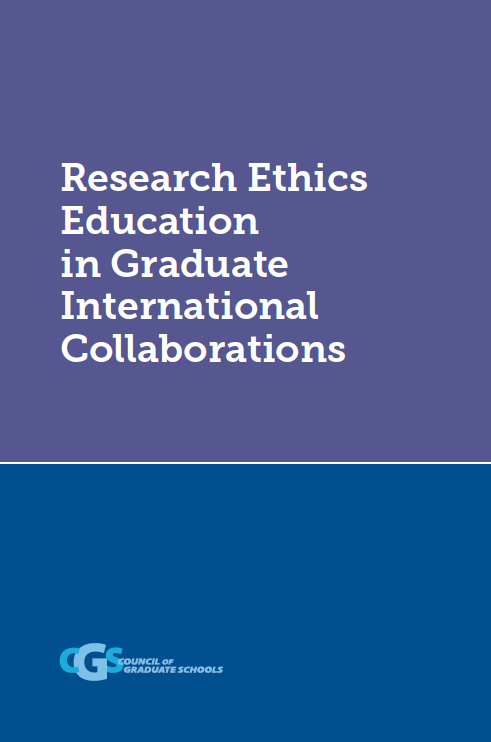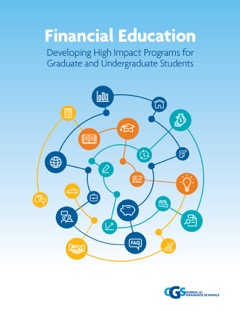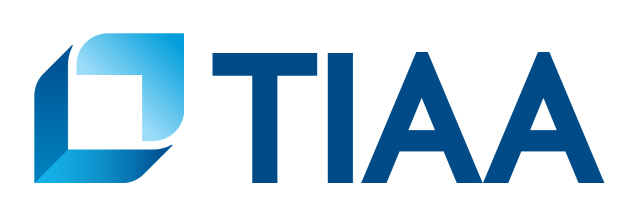You are on CGS' Legacy Site.
Thank you for visiting CGS! You are currently using CGS' legacy site, which is no longer supported. For up-to-date information, including publications purchasing and meeting information, please visit cgsnet.org.
Featured
The Council of Graduate Schools conducted a pilot project in 2014-16 to study the professional development needs of graduate students in Science, Technology, Engineering and Mathematics (STEM) fields and the programs and resources in place to meet those needs.
Project Overview
Enhanced professional development of STEM graduate students has emerged in recent years as a high priority as evidenced by calls from students, employers, funding agencies, and graduate deans. The CGS pilot study gathered perspectives from stakeholders representing each of these groups to answer four key questions:
- Beyond research skills, what other professional skills are particularly important for STEM graduates?
- What STEM workforce skills needs are not currently being met by graduate programs?
- How can resources and investments be most effectively mobilized to meet that demand through enhanced professional development?, and
- What structures and learning environments are most effective in responding to the career tracks for PhD and master’s students?
The project entailed a survey of CGS members, interviews with employers from across the STEM workforce including industry and government, a workshop convening a wide array of stakeholders, and an online searchable database of existing professional development programs for STEM graduate students.
Results
 Promising practices, common challenges, recommendations, and possible next steps toward coordinated improvements to the professional development of STEM graduate students, including PhDs, master’s degree holders, and postdoctorates are available in the report: Professional Development: Shaping Effective Programs for STEM Graduate Students. This report also includes discussion of useful tools and resources, as well as of issues that commonly arise in university discussion around professional development. Hard copies of this report are available to CGS members and non-members for purchase here.
Promising practices, common challenges, recommendations, and possible next steps toward coordinated improvements to the professional development of STEM graduate students, including PhDs, master’s degree holders, and postdoctorates are available in the report: Professional Development: Shaping Effective Programs for STEM Graduate Students. This report also includes discussion of useful tools and resources, as well as of issues that commonly arise in university discussion around professional development. Hard copies of this report are available to CGS members and non-members for purchase here.
Professional Development Programs: An Online Compendium
CGS has compiled an online searchable database of existing professional development programs for STEM graduate students that draws from survey results, web research, and feedback from institutions. The primary purpose of this database is to spotlight promising programs, enhance understanding of the skills and structure of these programs, and to provide an opportunity for graduate schools to connect to others as they seek to develop robust professional development programs for graduate students. While all are welcome to explore this database, the resource was designed especially to inform individuals in university leadership roles who seek to enhance professional development for STEM graduate students and postdocs at U.S. universities.
Workshop
A one-day, workshop-style meeting to identify needs and opportunities for improving U.S. graduate education with a focus on enhanced professional development for STEM PhD’s and master’s students took place in Washington, D.C., on November 8-9, 2015. The meeting convened key employers from industry, government, and non-profit sectors; graduate deans and university researchers on graduate education and the STEM workforce; and representatives from federal agencies that fund STEM graduate students.
Workshop Agenda and Presentations
Contact
Supported by a grant from the National Science Foundation (NSF #1413827)
Any opinions, findings, and conclusions or recommendations expressed in this project do not necessarily reflect the views of the National Science Foundation.
Contacts:
Julia Kent, CGS
(202) 223-3791 / jkent@cgs.nche.edu
Washington, DC — The Council of Graduate Schools (CGS) has announced that Robert M. (Bob) Augustine, Dean of the Graduate School, Research and International Programs at Eastern Illinois University (EIU), has been appointed to a two-year term as the Council’s Senior Vice President. In addition to serving two terms as President of the Illinois Association of Graduate Schools, Augustine served on the CGS Board of Directors from 2011 to 2014 and held the position of Board Chair in 2013. He will join CGS on August 1, 2015.
The newly created Senior Vice President’s role will expand the services that CGS provides to master’s-focused institutions. Working with colleagues in CGS’s Best Practices division, Augustine will be responsible for developing an infrastructure for research on issues related to the master’s degree and for delivering programs relevant to the needs of master’s-focused institutions. He will also be responsible for the management and convening of the CGS Master’s Committee.
“For a number of years now, Bob Augustine has shared his deep knowledge of trends in master’s education with CGS members through board service and voluntary leadership roles in CGS meetings,” said CGS President Suzanne T. Ortega. “I am delighted that he will be extending his impact in this important area, and in graduate education more broadly, as a member of CGS’s leadership staff.”
Augustine will bring to CGS diverse experience in developing best practices for serving master’s degree students. During his tenure as graduate dean, EIU’s graduate school earned the ETS/Midwestern Association of Graduate School’s Award for Excellence in Graduate Education for the First Choice Graduate Programs Initiative. His institution was also awarded the ETS/CGS Award for Promoting Success in Graduate Education for developing the Integrative Graduate Studies Institute, as well as the CGS/TIAA-CREF Award for Enhancing Financial Literacy, which allowed EIU to launch a center devoted to Literacy in Financial Education.
Commenting on the appointment, Augustine said, “I am energized by this fantastic opportunity to contribute to the mission and values of the graduate community through the work of the Council of Graduate Schools. I look forward to advancing my new priorities as Senior Vice President.”
Augustine holds a PhD in communication sciences and disorders from Southern Illinois University at Carbondale, where he earned a Department Distinguished Alumni Award. Following clinical experience in speech-language pathology, he launched an early intervention language clinic focusing on integrative language strategies at EIU. Augustine guided expansion of the program, launched the first technology-enhanced courses, and developed the program’s first international outreach efforts before becoming Dean of the EIU Graduate School in 2000.
The Council of Graduate Schools (CGS) is an organization of over 500 institutions of higher education in the United States and Canada engaged in graduate education, research, and the preparation of candidates for advanced degrees. Among U.S. institutions, CGS members award 91% of the doctoral degrees and 81% of the master’s degrees.* The organization’s mission is to improve and advance graduate education, which it accomplishes through advocacy in the federal policy arena, research, and the development and dissemination of best practices.
* Based on data from the 2013 CGS/GRE Survey of Graduate Enrollment and Degrees.
Today’s graduate and undergraduate students are in a much different place financially than previous generations of students. In 2012, total student debt for the first time exceeded $1 trillion and is now over $1.3 trillion. Rising debt levels can cause some students to defer graduate study or to decide that a graduate degree is not for them. At a time when public funding for education is decreasing and student debt is rising, more students are taking on debt to support their educational aspirations.
To help students learn how to successfully manage their finances and educational costs, the Council of Graduate Schools, funded by a grant from TIAA, a leading financial services organization with a long history of serving those in the academic, research, medical and cultural fields, launched a three-year project to enhance the financial literacy of graduate and undergraduate students.
Project Goals
Participating colleges and universities designed programs that prepare students to play an active role in managing their personal finances and making informed decisions about saving, spending, and borrowing. The institutions addressed the needs of different groups of students, while considering factors such as their field of study, degree levels, and chosen career pathways, each of which has significant financial ramifications. CGS and partnering institutions collected and analyzed data to inform the development of innovative, new tools and resources for students.
Key lessons and data from this groundbreaking program are available in the report: “Financial Education: Developing High Impact Programs for Graduate and Undergraduate Students,” available in PDF and at studentfinancialsuccess.org. Through this initiative, CGS and partnering universities developed and delivered high quality financial literacy programs, assessed the impact of those programs, and documented best practices. Financial Education illustrates these efforts in-depth and provides diverse and innovative models and practical resources for helping produce and shape effective student financial education programs. This book will be of particular interest to graduate deans, financial aid officers, program directors, and faculty who are interested in understanding the financial circumstances and meeting the needs of today’s graduate students. Hard copies of this report are available to CGS members and non-members for purchase here.
GradSense
CGS has developed GradSense.org, a unique online education platform that provides students with financial information about a range of topics including the value of pursuing an advanced degree. Through interactive visualization tools and engaging infographics, we invite students to better understand a variety of issues related to borrowing and spending, potential future earnings, and money management.
To integrate GradSense and related resources into your webpages, click here.
Online Resource Library
CGS has compiled helpful resources and tools for institutions, deans, and program directors seeking to prepare students for managing their personal finances and making informed decisions about saving, spending, and borrowing.
Research Partners
Through a competitive proposal process involving an independent selection committee, 15 institutions were selected and participated in the project as funded research partners. The institutions selected were:
- Arkansas State University
- Cornell University
- The Ohio State University
- University of Colorado System
- Eastern Illinois University
- Florida A&M University
- Iowa State University
- Kansas State University
- Loyola University Chicago
- Mississippi State University
- University of Illinois at Urbana-Champaign
- University of Kentucky
- University of Maryland, Baltimore County
- University of South Florida
- Winthrop University
An additional 19 universities participated in the project as affiliate partners.
Contacts
In collaboration with:
A recently released CGS publication is available online:
Online Graduate Education
This practical guide for graduate deans and administrators supports the development of quality distance education programs that are aligned with institutional mission and strategic direction. Touching on a range of issues from faculty professional development to assessment, accreditation, and financial structure, Online Graduate Education addresses the administrative policies and practices for improving access, cost-effectiveness and quality. 55 pages. June 2013.
CGS provides free electronic access to all our publications at the Member Library. Any administrator, faculty, or staff member of a CGS member institution may view, download, or print copies of CGS titles in PDF format (login required).
Print copies of this publication are also available for purchase in the Online Store. CGS members receive discounted rates. To order, access the publication in the Member Library. For complete details on CGS publications, visit cgsnet.org/publications.
Nominations for the 2022 award should be submitted by April 29th.
Named in honor of the first president of the Council of Graduate Schools and first presented in 1972, this award is made annually to a scholar-teacher in the humanities.
The recipient must be teaching at a U.S. or Canadian university, have earned a doctorate within 7 years of the award date, and have written a book of scholarly importance in that same timeframe. Subjects fields are selected annually. Awards have been made in literature, history, linguistics, foreign languages, philosophy, archaeology, and musicology.
Important Guidance on Field Eligibility:
Your university is welcome to submit a nomination that is interdisciplinary, so long as the book draws heavily from the methods and scholarship of the current year's field of competition Religious Studies. Since CGS is not in a position to advise you on the eligibility of particular works of scholarship, it is up to your institution to determine whether the book sufficiently meets this criterion, and with the understanding that your nomination will be evaluated alongside other books in the field of competition.
Current Year Award Description
Contact
Attendees at the CGS 54th Annual Meeting in Washington, DC, enjoyed engaging sessions, terrific speakers and exciting networking. Flip through this gallery of for an overview of meeting highlights. (More photos coming soon.)
The ability to resolve ethical issues that arise in international research is critical to the success of U.S.-trained scientists and engineers. It is also essential to ensuring the integrity of U.S. research with international partners. With funding from the National Science Foundation (NSF #1135345), CGS completed a three-year, collaborative project to develop accessible and replicable models for preparing STEM researchers to navigate ethical challenges in international research collaborations.
Project Goals
- Identify and test learning outcomes for research ethics education in international collaborations
- Document approaches to using those outcomes to enhance the preparation of STEM graduate students
- Develop case studies based on successful programs and an online repository of graduate learning outcomes
Project Outcomes

Research Ethics Education in Graduate International Collaborations
Online Repository: Learning Outcomes & Assessment Tools
Research Partners
Through a competitive process, the following institutions were selected to participate in the project as funded research partners:
An additional six universities participated as affiliate partners:
- Drexel University
- Indiana University
- Loyola University Chicago
- Mississippi State University
- North Carolina A&T University
- Purdue University
Additional Resources
More information about the project goals and background can be found in a CGS Framework Paper written to guide the development of proposals.
Contact
Supported by a grant from the National Science Foundation (NSF #1135345)
Since 2004, the Council of Graduate Schools (CGS) has conducted a multi-year empirical examination of international graduate application, admission, and enrollment trends.
This analysis responds to member institutions’ concerns about continuing changes in the enrollment of students from abroad seeking master’s and doctoral degrees from U.S. colleges and universities.
Fall 2021 International Survey is Now Open!
- Click here to access the complete collection of survey documents.
- For the “De-identified Individual Level Data Submission Workbooks”
- Application Admission First-time Graduate Enrollment Workbook (AP OA FT Workbook), upload to: https://cgs.workplace.datto.com/filelink/68049-61bacc5f-bbbb778215-2
- Total Graduate Enrollment Workbook (TT Workbook), upload to: https://cgs.workplace.datto.com/filelink/68049-61baccb4-9133e95528-2
- For the “Aggregated Institutional Level Data Submission Workbook”, upload to: https://cgs.workplace.datto.com/filelink/68049-61bacb27-8f20cce3f4-2
- If you have any questions about the current survey, please contact Enyu Zhou and Janet Gao at research@cgs.nche.edu
Historical reports
Reports, press releases, survey definitions, and questionnaires dating back to 2007 are available free online here.
Contact
For more information about the CGS International Graduate Admissions Survey, please contact Janet Gao.







